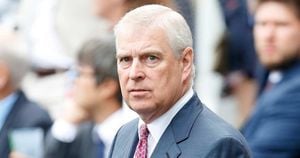The geopolitical dynamics surrounding Syria are rapidly shifting as the region begins to take its first steps toward recovery following the fall of long-time leader Bashar Assad. Various stakeholders are signaling their readiness to assist in reconstruction efforts, but significant challenges remain, particularly concerning humanitarian safety and legal repercussions for the former regime's actors.
Among the most notable developments, Turkey's Defense Minister Yaşar Güler has publicly stated his country’s readiness to support the troops loyal to the new Syrian government. "We have military training and cooperation agreements with many countries. We are ready to provide the necessary support if the new administration requests it," Güler said on Sunday, underscoring Turkey's military ties with Syria's potential new rulers, who are largely Islamist-led rebels.
Simultaneously, the UN’s Special Envoy for Syria, Geir Pedersen, arrived in Damascus, where he expressed hope for the swift lifting of sanctions imposed on the country to aid economic recovery efforts. "We will hopefully see a quick end to sanctions so we can rally around building up Syria," Pedersen remarked, indicating the potential for international cooperation.
With the recent shifts, thousands of Syrian migrants have started returning to Syria from Turkey. Turkish Interior Minister Ali Yerlikaya reported over 7,600 Syrians crossed the border back home over just five days. The number of daily crossings increased dramatically, from 3,000 to between 15,000 and 20,000, as Turkey pushed to see more refugees return to their homeland amid rising anti-Syrian sentiment.
Many of these returnees are driven by hope for stability and normalcy, particularly with schools reopening across Syria, marking what many see as the beginning of reconstruction efforts. At Nahla Zaidan school, which raised the three-starred revolutionary flag, director Maysoun Al-Ali said, "Syria is trying to build up this country with these children who came. Although I think some of them are afraid, they came to build Syria and to live the victories of this country." This sentiment highlights the willingness of some citizens to contribute to their homeland's rebuilding.
While the education system shows signs of revival, the risks posed by unexploded ordnance cannot be overlooked. The UK-based charity Halo Trust has warned of the dangers associated with returning to post-conflict areas, as they reported significant increases—over tenfold—in inquiries about landmines and unexploded bombs. Callum Peebles, overseeing the organization's operations, emphasized the need for caution, especially around young children who are often most susceptible to such hazards.
Internationally, Germany has positioned itself with strong rhetoric against those seeking refuge after participating in the Assad regime's alleged atrocities. Foreign Minister Annalena Baerbock proclaimed, "We will bring all the regime's henchmen to account for their terrible crimes with the full force of the law." This stern position reflects Germany's past legal actions against former Syrian officials involved in war crimes, reinforcing its commitment to justice even as Syria's dynamics evolve.
The Association of German Transport Companies (VDV) echoed the need to safeguard Syrian workers currently contributing to the economy. VDV chief, Ing. Wortmann, argued against calls for repatriation, stating, "We harm Germany as a business location if people who want to work here cannot stay with us." This highlights the balancing act Germany faces between domestic labor needs and the international legal ramifications of the Syrian conflict.
The current repercussions of the Assad regime's downfall are palpable across diplomatic channels. The Turkish government appears eager to solidify relationships with the new Syrian administration, especially as they seek to demonstrate their legitimacy. Turkish officials support the new administration's call to respect existing governmental structures and international organizations, signaling readiness for collaboration.
Overall, as these varied actors navigate the post-Assad era, the focus remains on swift recovery and stabilization of the war-torn nation. Despite evident progress such as school reopenings and the return of migrants, challenges such as unexploded ordnance and the legal accountability of former regime members cast shadows over the hopeful narratives. Each step taken will influence the broader humanitarian and geopolitical realities, both within Syria and for its neighbors.



